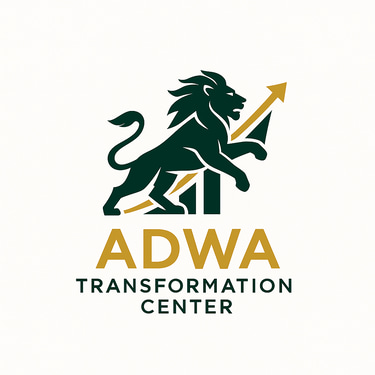From Shewa Robit to Michigan: A Journey of Perseverance and Triumph
Today, we have the pleasure of featuring Makda Abebe, a software engineer who graduated from the prestigious MIT and now resides in Michigan with her family. Born in Shewa Robit, Ethiopia, Makda's journey to financial freedom began with just $1,000 and a dream. After navigating the ups and downs of the stock market, her perseverance and dedication have led to remarkable success. Let's dive into her inspiring story!
10/6/20246 min read


"Never give up, despite the challenges! Investment, fueled by hard work and knowledge, leads to financial freedom." - Makda Abebe
Dr Abush:- Welcome to the Adwa Transformation Center Blog, Makda! We're excited to hear about your investment journey and the success you've achieved.
Makda: Thank you, Dr. Abush! I'm happy to be here. I was born and raised in Shewa Robit and came to the US at the age of 17. I worked hard in school and was fortunate to receive a scholarship to MIT, where I earned a degree in software engineering. It was during my time there that I first heard about investing in the stock market. Seeing some of my friends benefiting from stocks their families had purchased sparked my interest in joining the market. Initially, I was intimidated. I thought investing was a game for the wealthy, and I didn't see how I, an ordinary person, could participate.
Dr. Abush: That's understandable. Growing up in Ethiopia, you likely had limited exposure to the stock market. Plus, there's often a misconception that investing is only for the rich. In America, anyone who buys even a single share of stock is considered an investor. (smiles) So, how did you get started?
Makda: My first encounter with stocks was like a child marveling at something beautiful – I was captivated by the allure of the stock market. But that quickly turned into a shock. The price of the first stock I bought plummeted within a day, and I was in a panic. That was my crash course in market volatility! Honestly, my heart was pounding like a drum. (laughs)
As a novice investor, buying that stock felt like indulging in a sugary treat – it was sweet at first, but it ended with a stomach ache! (laughs)
Dr. Abush: How did you overcome your fear and continue investing?
Makda: As an Ethiopian woman, I carry the spirit of Adwa in my blood. Our ancestors triumphed at Adwa* through bravery, unity, and strategic thinking. I applied those same values to the world of investing. I started very cautiously, with just $1,000, and I didn't want to lose it.
Dr. Abush: What challenges did you face as a beginner?
Makda: Oh, so many! Initially, the market felt like a vast ocean, with unfamiliar terms washing over me. The language of the stock market was foreign, like learning English all over again. One day, while reading financial news, I felt like I was lost in a foreign country, drowning in a sea of jargon! I could speak English, but in the stock market, I was a monkey! But I'm stubborn – once I start something, I see it through. So I persevered.
Dr. Abush: It's true, there's a lot of jargon. How did you overcome these challenges? What strategies did you use?
Makda: Education is key. I continuously read about investing, the stock market, and the economy. I sought advice from experts. And most importantly, I gained practical experience. I started with small amounts and gradually learned and grew.
Dr. Abush: What advice do you have for beginners who want to invest in the stock market?
Makda: Firstly, understand that investing is a long-term journey. You won't become rich overnight. Secondly, education is crucial. Learn about the market, the economy, and the type of investments you're interested in. Consult with experts. And above all, don't be afraid.
Dr. Abush: As a woman and an immigrant, what unique challenges have you faced in the investment world?
Makda: To be honest, the investment world felt alien to me at first. I often felt like I didn't belong. Especially in the tech sector, as a woman, I sometimes struggled to be taken seriously. I'm a software engineer, but that knowledge didn't seem to have a place in the stock market.
The way people perceive you as a female investor is quite surprising. One day, at an investment seminar, someone came up to me and asked, "Excuse me, would you bring me some coffee?" I was furious! I wanted to tell him to get it himself, but I held back. I was there as a participant, not a waitress. That's when I realized there are still many obstacles for women in this field. And being Black adds another layer of complexity.
Dr. Abush: How did you overcome these challenges?
Makda: I believed in myself. I knew I could be successful, just like anyone else. I expanded my knowledge, connected with other female investors, and most importantly, I never gave up.
Dr. Abush: Any funny or memorable moments during your investment journey?
Makda: Once, I acted on a "hot tip" and invested in a company without doing any research. The next day, the stock plummeted! That was a valuable lesson – always do your due diligence. I thought I was going to make a killing, but I got killed instead! (laughs)
Dr. Abush: We met three years ago when you attended our seminar in Ethiopia. How did that impact your investment strategy?
Makda: Immensely! The training gave me a solid understanding of market fundamentals. I learned to avoid emotional decision-making. And most importantly, I learned patience. I realized the importance of diversification to reduce risk. For example, I've invested in companies like Uber, ExxonMobil, Nvidia, and Amazon. I also hold government bonds and index funds like Vanguard. This diverse portfolio has helped me mitigate risk. The seminar significantly enhanced my existing knowledge.
Dr. Abush: Those seem like excellent choices. The global economy is currently facing challenges. What advice do you have for people who want to invest during these times? How are you navigating the current situation?
Makda: Yes, the economy is tough right now. On the one hand, there's good news – inflation is decreasing, and interest rates have started to decline. But the overall economic situation is still uncertain. Plus, we're in an election year. If Trump wins, the market will likely be volatile, so we're already bracing ourselves. But that doesn't mean we shouldn't invest. The key is to choose carefully and focus on long-term growth. I'm not a fan of highly volatile investments like cryptocurrencies and day trading. Instead, I prefer to reduce risk by diversifying my portfolio.
Dr. Abush: How has the victory at Adwa influenced your investment journey?
Makda: The victory at Adwa is a source of unwavering spirit for me. If our Ethiopian ancestors could defeat the Italian army at Adwa, then I can overcome the challenges in the market and succeed. Adwa isn't just a place in northern Ethiopia; it represents the struggles in each of our lives. Life is a battle, and we are all warriors. Adwa teaches us that beyond courage, patience and perseverance are crucial in investing.
Dr. Abush: What future changes do you envision for your investment strategy?
Makda: I'll continue to expand my knowledge and explore new investment options. I believe I need to focus more on artificial intelligence and renewable energy stocks. Nvidia alone isn't enough. I also want to share my experiences with others, especially by teaching women about the importance of investing. I've already started educating my children about money and investing from a young age.
Sometimes, when Ethiopians ask me about my investments, I jokingly say, "I just take my money and hide it under my pillow, hoping it will multiply!" When they look confused, I smile and say, "Honestly, investing is like enjoying a good cup of coffee. It might be bitter at first, but the end is rewarding." Some are quite funny, asking me to tell them the "best" stock to buy. (smiles)
Dr. Abush: And what do you tell them?
Makda: (laughs) If they want something comfortable, I tell them to buy a nice sponge mattress and sleep on it! (laughs) The stock market isn't like that. It's filled with both ugly and beautiful moments. It's like sleeping on a hard floor – you toss and turn, trying to get comfortable.
Dr. Abush: That's a great analogy! By the way, teaching children about finances early on is so important. I agree. I've also been teaching my children about finances. What does your husband say about your investment journey? Is he supportive?
Makda: (smiles) Initially, he urged me to stop. He was worried about the risks. But as I worked hard and started seeing results, his perspective changed. Now he's even more enthusiastic than me! (laughs)
Dr. Abush: What message do you have for Ethiopian women, specifically regarding investing?
Makda: Don't underestimate yourselves in the investment world, even though it can be challenging. Learn, understand the risks, and believe in your abilities. I like to say that if I can do it, you can do it even better! Women actually have traits that are well-suited for investing. We're generally more patient than men. However, men tend to be bolder in taking risks. So, I encourage women to be fearless.
Dr. Abush: Makda's story demonstrates that with hard work, knowledge, and courage, anyone can achieve financial freedom. The international stock market training offered by the Adwa Transformation Center can help you achieve this success too.
During the training, you will gain:
A deep understanding of Ethiopian and global stock markets.
Direct support and guidance from experienced professionals.
Practical exercises that simulate real market conditions.
The ability to apply investment strategies effectively.
Opportunities to collaborate and network with fellow students.
Register today and embark on your journey to financial freedom!
Adwa Transformation Center - We're here to help you realize your financial dreams!
Share this inspiring story with your friends and family, and encourage them to start their own journey towards financial freedom.
(End of Interview)


